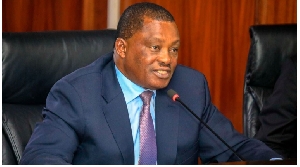 Kenya's Attorney General Justin Muturi in this photo taken on October 12, 2023
Kenya's Attorney General Justin Muturi in this photo taken on October 12, 2023
Kenya's Attorney General Justin Muturi on Tuesday pleaded with the Supreme Court to hear his application seeking the top court’s opinion on the legal consequences and effects of decisions of the East African Court of Justice (EACJ) on the country's sovereignty.
Mr Muturi said whereas there is no express provision in the East African Community (EAC) Treaty conferring upon the EACJ the jurisdiction to interpret the constitutions of partner states, the regional court has in several decisions, interpreted its jurisdiction to include the review of decisions issued by apex courts of member countries.
According to Mr Muturi, the decisions of the EACJ end up conflicting with judgments issued by the Supreme Court.
The AG through lawyer Mahat Somane cited a decision of the regional court awarding politician Martha Karua Ksh2.7 million ($16,000 at current exchange rate) in damages for infringement of her right to a fair trial in 2019.
“It is thus our position that the application seeks to unravel a legal uncertainty in a manner that promotes the rule of law and public interest,” Mr Somane submitted.
Apart from the Kirinyaga gubernatorial election petition, Ms Karua joined a case filed at EACJ by Male Mabirizi, following the dismissal of the August 2022 presidential election petition arising filed by Azimio La Umoja.
The Supreme Court ruled that the 2022 general election was conducted in accordance with the legal requirements of the Constitution and the Elections Act.
Mr Somane told the bench led by Chief Justice Martha Koome that the advisory opinion seeks to determine whether the decisions of the Supreme Court may be subjected to a review at the EACJ and what would be the legal consequences.
“The court also needs to determine the legal effect of a finding by the EACJ that a national court, including the Supreme Court, did not adhere to legal principles including natural justice and the rule of law, in a case heard and determined by the national court,” said the AG in his application.
The Attorney General said he was apprehensive that the exercise of appellate jurisdiction by the regional court over decisions by national courts may pose serious conflict to Kenya’s commitment to the rule of law, because of differing holdings by national courts on one hand and the EACJ on the other hand.
He said the conflict exposes the government to a legal dilemma when it comes to compliance with contradictory yet binding decisions from two courts, stemming from differing interpretations based on the same set of facts.
Mr Muturi wants the court to clarify which of the two different interpretations should be effected, to facilitate compliance.
Ms Karua opposed the application arguing that the reference is inviting the Supreme Court to usurp the role reserved to the regional court by the EAC Treaty.
She said the issues raised in the reference were concluded or pending litigation before the regional court and are thus either resolved or unripe for the advisory jurisdiction of this Court.
Through lawyer Dudley Ochiel, Ms Karua submitted that Article 27 of the Vienna Convention forbids State parties, like Kenya, from invoking provisions of its internal law as justification for failure to perform a Treaty.
Secondly, she said, Kenya’s Attorney General was abusing the advisory opinion process, to escape complying with lawful court decisions.
“Kenya has failed to comply with the order of the EACJ since 2019 when the appeal was dismissed. Instead of facilitating enforcement, the Attorney General chose to disregard Kenya’s binding Treaty obligations. He seeks an advisory opinion to escape compliance and to leave Ms Karua with no remedy,” said Mr Ochiel.
The court will give its ruling on notice.